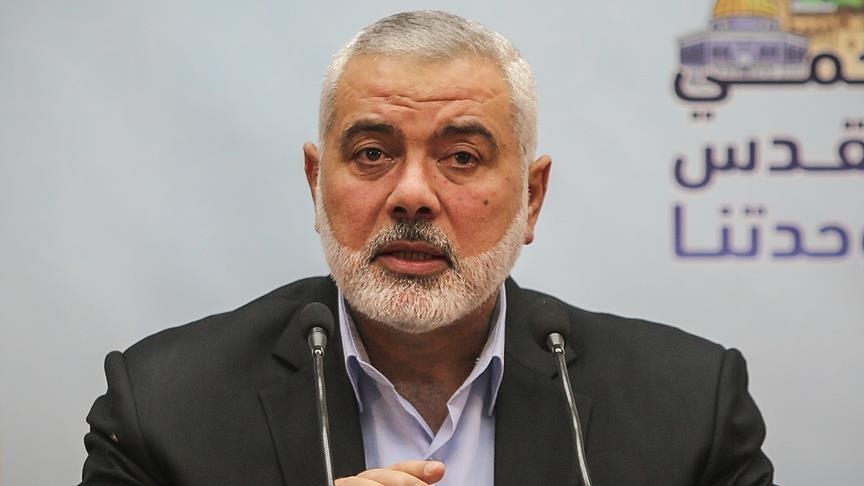Israel escalates regional conflict with high-profile assassinations
Assassination of high-profile figures in Syria, Lebanon, Iran after Gaza attacks initiated on Oct. 7, 2023

ANKARA
Israel has expanded regional conflict through a series of assassinations, beginning with the attack on Iran's Consulate in the Syrian capital of Damascus in April, and most recently targeting Hezbollah Secretary-General Hassan Nasrallah.
Tel Aviv has maintained its campaign for nearly a year since launching attacks on the Gaza Strip last Oct. 7,
The attacks have resulted in devastating consequences, with at least 41,586 Palestinians dead, including 16,795 children and 11,378 women, while 96,210 have been injured.
Despite warnings from the international community that the assaults on Gaza could escalate into a regional conflict, Israel has largely ignored them.
In defiance of the warnings, the Israeli administration initiated targeted high-profile assassinations in regional countries, in addition to operations in Gaza.
The first notable attack occurred on April 1 at Iran's Consulate in Damascus, where seven Iranian officials, including two generals from the Iranian Revolutionary Guard Corps, were killed in an operation for which Israel did not claim responsibility.
Israel-Iran tensions increase
Tensions between Tehran and Tel Aviv intensified significantly following the attack in Damascus.
In retaliation for the attack, Iran launched a strike on April 13 against Israel, deploying hundreds of kamikaze drones, ballistic missiles and cruise missiles.
Days later, on April 19, Iranian media reported explosions in Isfahan, a province housing an Iranian Air Force base, indicating Israeli involvement, although there were no reported casualties or damage.
Israeli media reported that the US had urged the administration in Tel Aviv not to conduct a widespread attack against Iran.
The period of heightened tension subsided as Tel Aviv did not significantly respond to the retaliation by Tehran.
Assassination of Shukri, Nasrallah's ‘right-hand man’
Israel continued its assassination campaign after the attack in Damascus, further escalating regional tensions.
On July 30, the Israeli army targeted Fuad Shukri, a senior Hezbollah commander, in an airstrike on an apartment in Beirut. The operation resulted in the deaths of at least four civilians, alongside Shukri.
Shukri, who was described as Nasrallah's "senior advisor in military affairs," was also considered to be Nasrallah's "right-hand man."
Following his assassination, the "controlled tension" that had existed between Israel and the Lebanese resistance group since Oct. 8, shifted to open conflict.
Haniyeh assassinated in Tehran
Hours after targeting Shukri, Israel carried out another assassination in the capital Iranian of Tehran.
The target was Ismail Haniyeh, the head of Hamas's Political Bureau, who was in Tehran to attend the swearing-in ceremony of Iranian President Masoud Pezeshkian. Haniyeh was killed in an attack at a guesthouse.
Although Tel Aviv did not claim responsibility, Iran and the Palestinian resistance group, Hamas, accused Israel of being behind Haniyeh's assassination.
Iran has not yet retaliated for the killing, which has further strained relations between Tehran and Tel Aviv.
Pager, radio explosions in Lebanon
Tensions between Israel and Hezbollah dramatically escalated when the pagers and radios of Hezbollah members were detonated within a day of each other in Lebanon.
Simultaneous explosions of the pagers occurred on Sept. 17, killing 12 people, including two children, and injuring 2,323.
Numerous radios exploded the following day, resulting in 25 deaths and more than 608 injuries.
Lebanese officials attributed the attack to Israel, though there has been no official response from Tel Aviv.
Continued assassinations
Israel launched further assassinations after the explosions, targeting high-ranking Hezbollah figures in Lebanon. An airstrike on an apartment in southern Beirut on Sept. 20 killed 45, including seven women and three children.
Hezbollah reported that 15 members, including high-ranking military commander Ibrahim Aqil, were killed in the attack.
Following Aqil's assassination, Israel conducted another airstrike in Beirut on Sept. 24, resulting in the death of Hezbollah commander Ibrahim Muhammad Kubaisi.
Israel claimed responsibility for that attack, asserting that Kubeisi oversaw Hezbollah's missile systems.
The Israeli army announced on Sept. 26 that it had targeted Muhammad Hussein Surur, another high-ranking Hezbollah commander, in Beirut. Surur was reported to have died in an airstrike and was believed to be responsible for Hezbollah's armed drone unit.
Nasrallah’s assassination
Israel targeted an area it claimed to be Hezbollah's command center in the Dahiyeh district in southern Beirut on Sept. 27.
Media reports in Israel said airstrikes involved more than 80 missiles, each weighing about one ton, and included numerous fighter jets.
The attack caused the collapse of six buildings and significant destruction in the area.
The Israeli army claimed responsibility for the assault, announcing that Hassan Nasrallah and Hezbollah's Southern Front Commander Ali Karaki had been killed.
Hezbollah confirmed Nasrallah's death, while there has been no statement regarding the fate of Karaki.
*Writing by Gizem Nisa Cebi in Istanbul








